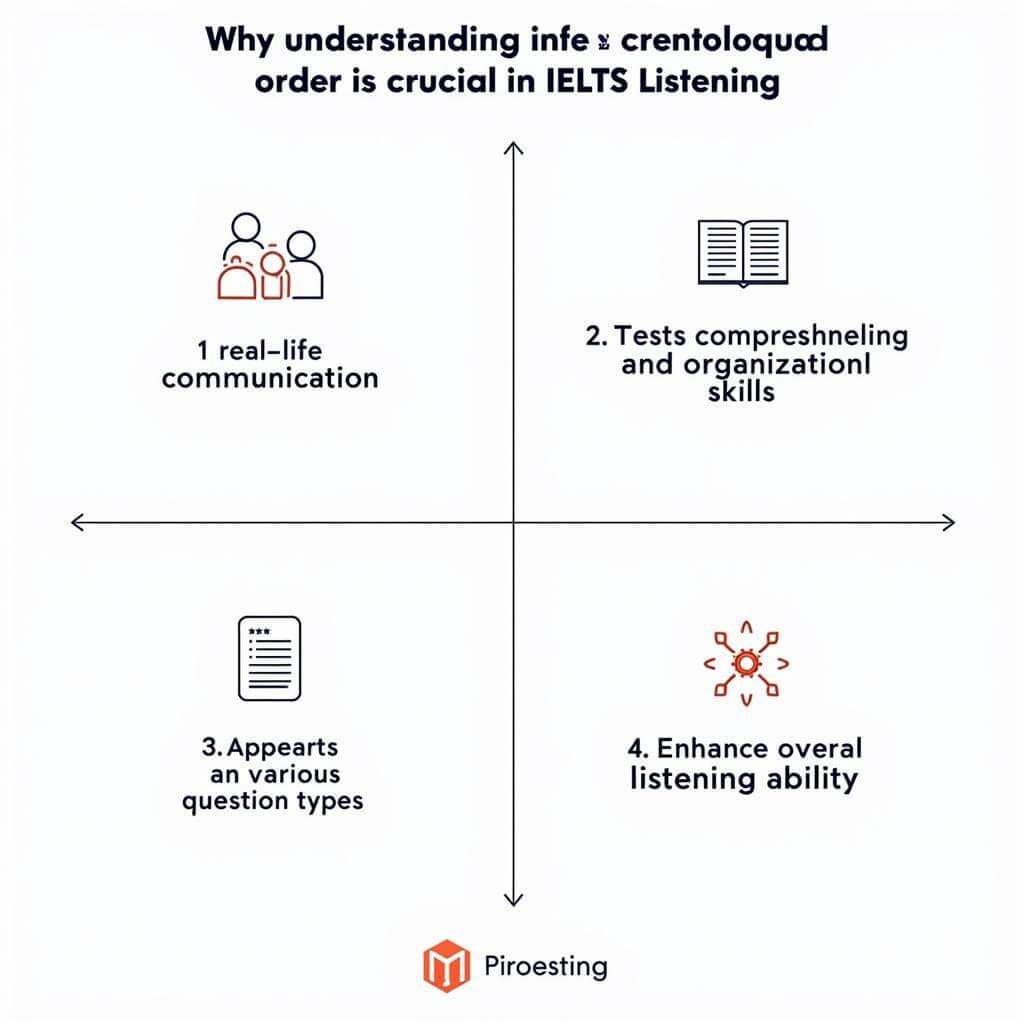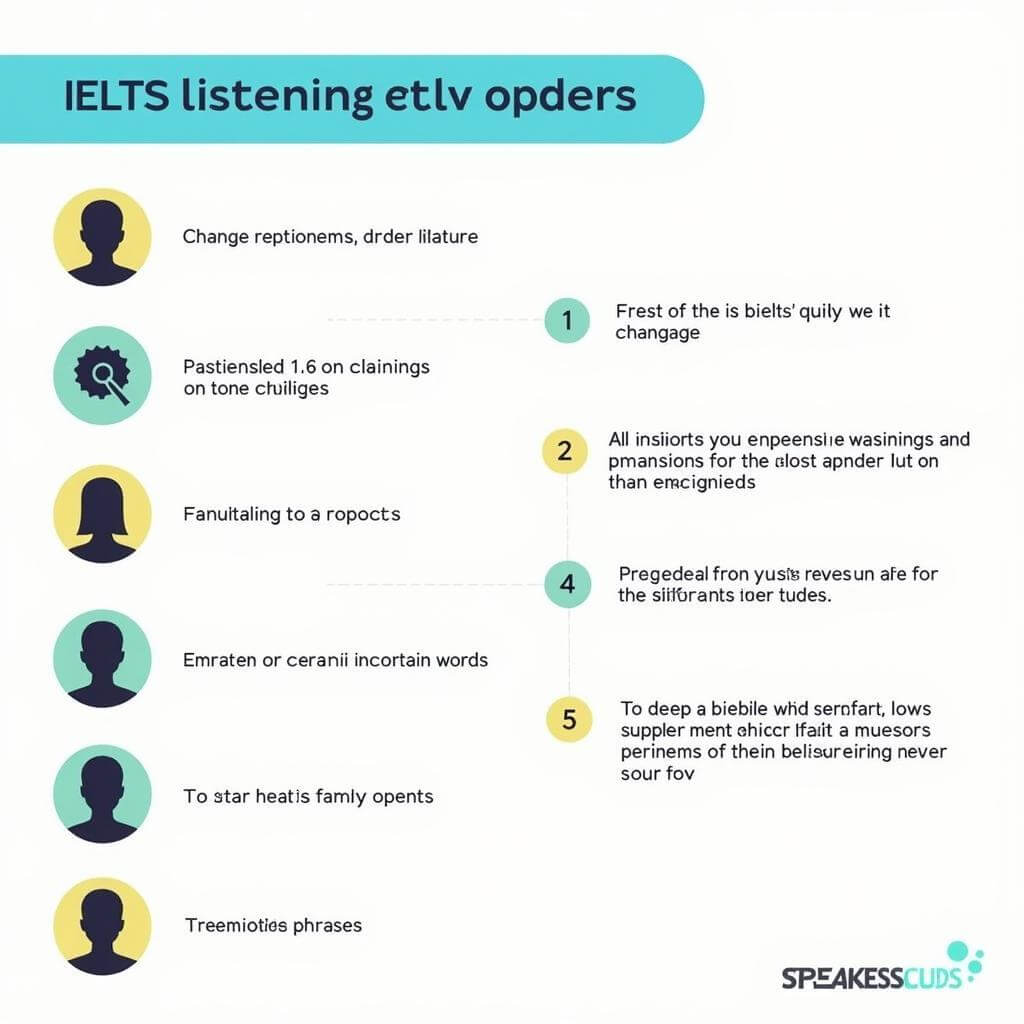The IELTS Listening test can be a source of significant anxiety for many candidates. However, with the right mindset and preparation, you can effectively manage test day stress and perform at your best. This comprehensive guide will provide you with expert strategies to tackle listening stress and boost your confidence on the big day.
Nội dung bài viết
- Understanding the Root of Listening Test Anxiety
- Practical Tips for Managing Test Day Listening Stress
- 1. Familiarize Yourself with the Test Format
- 2. Develop a Pre-Test Relaxation Routine
- 3. Improve Your Listening Stamina
- 4. Master Note-Taking Techniques
- 5. Practice Active Listening
- 6. Develop Strategies for Different Question Types
- 7. Improve Your Concentration Skills
- 8. Manage Time Effectively
- 9. Prepare for Accent Variety
- 10. Boost Your Confidence Through Vocabulary Enhancement
- On Test Day: Final Stress Management Strategies
- Conclusion: Embracing Confidence in IELTS Listening
- Frequently Asked Questions
- How can I stay calm if I miss a question during the IELTS Listening test?
- Is it normal to feel nervous before the IELTS Listening test?
- Should I guess if I’m unsure of an answer in the Listening test?
- How can I improve my concentration during long listening passages?
- What should I do if I encounter an unfamiliar accent in the test?
- How early should I arrive at the test center to manage stress?
- Can I wear earplugs during the IELTS Listening test?
Understanding the Root of Listening Test Anxiety
Before diving into specific techniques, it’s crucial to understand why the IELTS Listening test often triggers stress. Many test-takers worry about:
- Missing important information
- Losing focus during the audio
- Encountering unfamiliar accents
- Managing time pressure
Recognizing these common concerns is the first step in addressing them. Let’s explore how you can overcome these challenges and approach the test with a calm, focused mindset.
Practical Tips for Managing Test Day Listening Stress
1. Familiarize Yourself with the Test Format
One of the most effective ways to reduce anxiety is to know exactly what to expect. Make sure you:
- Understand the four sections of the IELTS Listening test
- Know the types of questions you’ll encounter
- Are aware of the time allocated for each section
By eliminating surprises, you’ll feel more in control and less likely to panic during the test.
2. Develop a Pre-Test Relaxation Routine
Establishing a calming routine before the test can significantly reduce stress levels. Consider:
- Practicing deep breathing exercises
- Visualizing success in the test
- Listening to soothing music on your way to the test center
Dr. Emma Thompson, a renowned IELTS coach, advises, “A 5-minute mindfulness meditation just before entering the test room can work wonders for your focus and calm.”
3. Improve Your Listening Stamina
Building your listening endurance is crucial for managing stress during the test. Here’s how:
- Gradually increase your practice session durations
- Listen to a variety of English accents regularly
- Practice with full-length mock tests under timed conditions
Remember, the more comfortable you become with extended listening periods, the less stressful the actual test will feel.
 IELTS candidate practicing listening with headphones
IELTS candidate practicing listening with headphones
4. Master Note-Taking Techniques
Effective note-taking can significantly reduce stress by ensuring you capture key information. Focus on:
- Using symbols and abbreviations
- Writing down numbers and proper nouns
- Organizing your notes in a clear, logical manner
“Efficient note-taking is like creating a roadmap for your answers. It guides you through the stress, keeping you on track,” says Mark Andrews, IELTS examiner with 15 years of experience.
For more advanced strategies on handling complex listening tasks, check out our guide on strategies for complex listening tasks.
5. Practice Active Listening
Engage with the audio content actively to maintain focus and reduce anxiety:
- Predict possible questions or topics before each section
- Visualize the scenarios described in the audio
- Mentally summarize what you’ve heard at regular intervals
This approach keeps your mind engaged and less likely to wander or panic.
6. Develop Strategies for Different Question Types
Each question type in the IELTS Listening test requires a specific approach. Familiarize yourself with strategies for:
- Multiple choice questions
- Matching exercises
- Form completion tasks
- Short answer questions
By having a game plan for each question type, you’ll feel more confident and less stressed when tackling them.
Learn more about handling various question formats in our article on how to focus on relevant information in IELTS listening.
7. Improve Your Concentration Skills
Enhancing your ability to concentrate can significantly reduce stress during the test. Try these techniques:
- Practice mindfulness meditation regularly
- Use focus-enhancing apps or games
- Eliminate distractions during your practice sessions
The better you can focus, the less likely you are to feel overwhelmed by the test’s demands.
 IELTS candidate using concentration techniques during listening practice
IELTS candidate using concentration techniques during listening practice
8. Manage Time Effectively
Time pressure is a significant source of stress in the IELTS Listening test. To combat this:
- Practice transferring answers quickly and accurately
- Use any available time between sections wisely
- Stay calm if you miss an answer – move on and focus on the next question
Remember, effective time management is key to reducing stress and maintaining composure throughout the test.
9. Prepare for Accent Variety
The IELTS Listening test features a range of English accents, which can be stressful for some test-takers. To prepare:
- Listen to podcasts, news broadcasts, and interviews from various English-speaking countries
- Pay attention to different speech patterns and intonations
- Practice transcribing audio featuring diverse accents
For more tips on handling different accents, visit our guide on preparing for unfamiliar accents.
10. Boost Your Confidence Through Vocabulary Enhancement
A strong vocabulary can significantly reduce stress by improving your overall comprehension. Focus on:
- Learning common IELTS topic-related vocabulary
- Understanding idiomatic expressions and colloquialisms
- Practicing with academic and technical terms
For strategies on dealing with complex vocabulary in the listening test, check out our article on managing audio with technical vocabulary.
On Test Day: Final Stress Management Strategies
As you enter the test room, remember these final tips:
- Arrive early to settle your nerves
- Do a quick relaxation exercise before the test begins
- Trust in your preparation and abilities
- Stay positive – your mindset can significantly impact your performance
Dr. Lisa Chen, cognitive psychologist specializing in test anxiety, states, “Remind yourself that feeling some stress is normal and can even enhance your performance. It’s all about channeling that energy positively.”
Conclusion: Embracing Confidence in IELTS Listening
Managing test day listening stress in IELTS is about preparation, mindset, and strategy. By implementing these expert tips and consistently practicing, you’ll not only reduce anxiety but also improve your overall performance. Remember, stress management is a skill that improves with practice. Stay focused, trust your abilities, and approach the test with confidence.
To further enhance your listening skills and speed, don’t forget to explore our guide on improving listening comprehension speed.
Frequently Asked Questions
How can I stay calm if I miss a question during the IELTS Listening test?
Take a deep breath, refocus on the audio, and move on. Remember, it’s better to miss one question than to lose focus and miss several.
Is it normal to feel nervous before the IELTS Listening test?
Absolutely. Some nervousness is normal and can even help you stay alert. The key is managing this anxiety so it doesn’t overwhelm you.
Should I guess if I’m unsure of an answer in the Listening test?
Yes, always provide an answer. There’s no penalty for incorrect answers, so an educated guess is better than leaving a blank.
How can I improve my concentration during long listening passages?
Practice active listening techniques, such as visualizing the content or mentally summarizing key points. Regular meditation can also enhance your focus.
What should I do if I encounter an unfamiliar accent in the test?
Stay calm and focus on the overall message. Remember that you’ve prepared for this by exposing yourself to various accents during practice.
How early should I arrive at the test center to manage stress?
Aim to arrive at least 30 minutes early. This gives you time to relax, use the restroom, and mentally prepare without feeling rushed.
Can I wear earplugs during the IELTS Listening test?
No, earplugs are not allowed. However, the test is conducted in a quiet environment, and you’ll be provided with headphones for clear audio.


